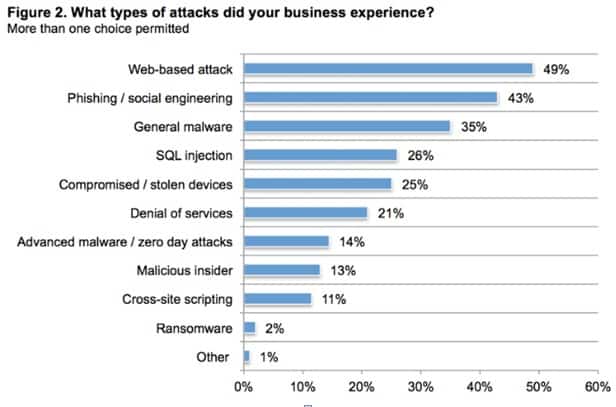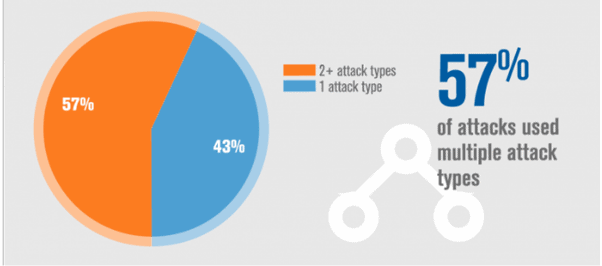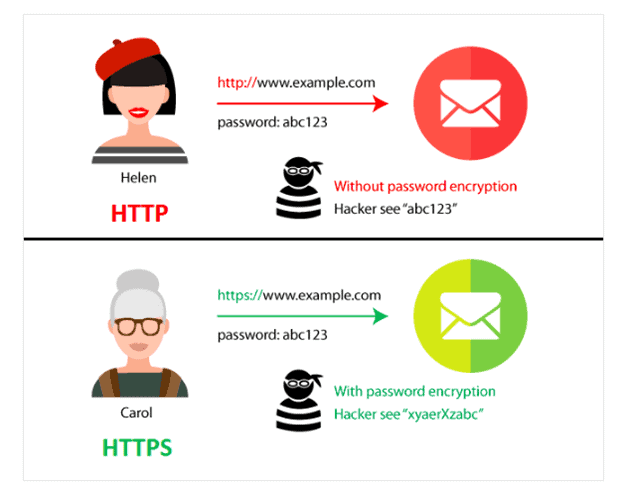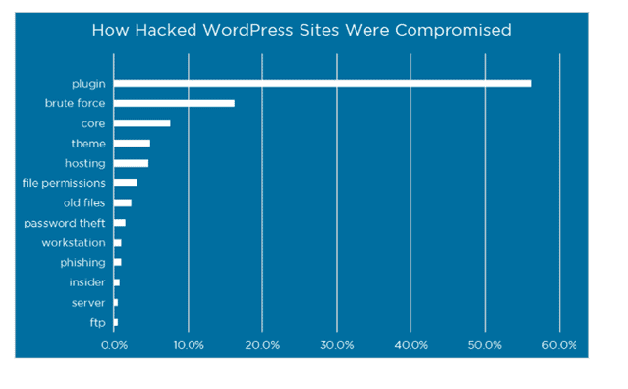Building a website is already challenging enough without having to worry about all the security features you’ll need. Research security firm Panda Security published a study revealing that 230,000 new malware samples are being launched daily. By 2021, the cost of cybercrime damage will hit the $6 trillion mark.
Big businesses aren’t the only ones susceptible to cyber-crime. In fact, small businesses prove to be perfect targets for hackers, simply because they tend to be lackluster with security and therefore easier to penetrate. One study found that 60% of small businesses experience some type of hacking issue annually.
“The fact is, every company is vulnerable to being hacked,” Kevin Kerridge of Inc. explained. “The large breaches make the news, but smaller breaches are being perpetrated every day. They may not make headlines, but they can turn a company’s world upside down.”
The types of cyber attacks on small businesses vary :

Photo via Small Business Trends
If you want your lead generating landing pages just be just as secure as they are well-designed, there are certain precautions you can take. Here are a few landing page security tips to help your business.
Use a Content Delivery Network
Content delivery networks (CDNs) make it easy for users around the world to access your site. Once a webmaster signs up for a CDN, they’ll have access to servers all across the globe.
This means a person visiting your website on another continent does not have to wait long for information to be relayed from your origin server to their own local server.
However, a CDN does much more than just increase relay speed; it also helps improve your website security. A CDN network comes equipped with dozens of edge servers, which can absorb a potential DoS attack from getting through.
Therefore, the ability for a DoS attempt to reach a single point of failure is greatly diminished. This is important, since 57 percent of DDoS attacks were from multiple types.

Photo via Verisign
Research Your Hosting Company
Some hosting companies are able to reel customers in with false promises and absurdly low prices. The fact is, hosting itself is already a pretty manageable expense. Choosing to shave a few dollars off a monthly fee can mean the difference between a safe site and an unsecure one.
Consider some of the worst hosting horror stories: Crazy Domains, a website hosting company, tanked hundreds of business after it lost thousands of website data and offered only a $100 credit for the mistake.
Claire Broadley, a website designer with over 20 years experience creating websites, detailed her many website hosting issues in this blog post. In it, she described how after one day of being with her first host, her site went down after a blizzard hit the hosts’ data centers.
A great hosting company is protected across the board, regardless of any weather emergencies that might occur.
Poor hosting companies don’t have the level of protection that your business needs. Always do your due diligence when choosing a host; read reviews, discuss your concerns with customer service, and pay close attention the way support teams handle your hesitation.
Don’t Forget Your SSL Certificate
An SSL certificate helps you secure your servers, and you should always purchase that extra layer of security from your host. You’ll notice the difference between sites that do have a certificate and those that don’t by taking a glance at the URL: those SSL-certified show a web address beginning with “HTTPS,” while others begin with just “HTTP.”
The difference between HTTP vs. HTTPS is important . . .
 Photo via SEOPressor
Photo via SEOPressor
With that extra layer of security, data that’s transferred from the server to the website can be easily intercepted and stolen. With an SSL certificate, all in-transit data is properly encrypted to prevent this from happening.
Furthermore, Google announced earlier this year that they would begin warning search users which websites weren’t properly secured, which could dramatically impact website traffic and SEO.
Leverage Security Plugins
If you’re using a platform like WordPress, you’re in luck. WordPress has a variety of security plugins that extend the security functionality provided by your host and other forms of security. Here are some of the best WordPress security plugins when creating a landing page.
WordFence
WordFence is one of the more popular WordPress plugins. It continuously checks your website for any malware infections by scanning every single file on your site, on the back and front ends, including plugins, your theme, and the WordPress core. It also allows you to add two-factor authentication via SMS.
WordFence security features include:
- Firewall rule and malware signature updates
- IP blacklist blocks
- Integrated malware scanner
- Web application firewall
Sucuri Security
There are several security features offered with Sucuri Security. Features include security activity auditing, malware scanning, blacklist auditing, and an advanced website firewall. Overall, it protects your site from brute force attacks, DoS attacks, and Zero Day Disclosure patches.
Sucuri Security features include:
- File integrity monitoring
- Security auditing
- Post-hack security options
- Security notifications
- Blacklist monitoring
iThemes Security
According to iThemes, there are over 30 ways the plugin can protect your website. To start, it will scan your entire sure to be certain there are currently no vulnerabilities that would expose it to an attack. This preventative approach can help you out in the long-run. Like some of the other available plugins, it forces users to create ultra-strong passwords and has 24/7 security monitoring.
iThemes Security features include:
- Two-factor authentication
- Malware scan automated scheduling
- Google reCAPTCHA
- Online file comparison
- WP salts and security keys
It is important to note that the type of plugins you download and use on WordPress is important. In fact, many WP attacks happen through plugins.
 Photo via Wordfence
Photo via Wordfence
Wrapping Up . . .
Making landing page security part of your business process is critical. The increased number of hacks and cyber attacks happening year-over-year is staggering, and protecting your business, whether enterprise or small business needs to be a must. There are a number of ways to make this a priority! Is site security on your mind?

